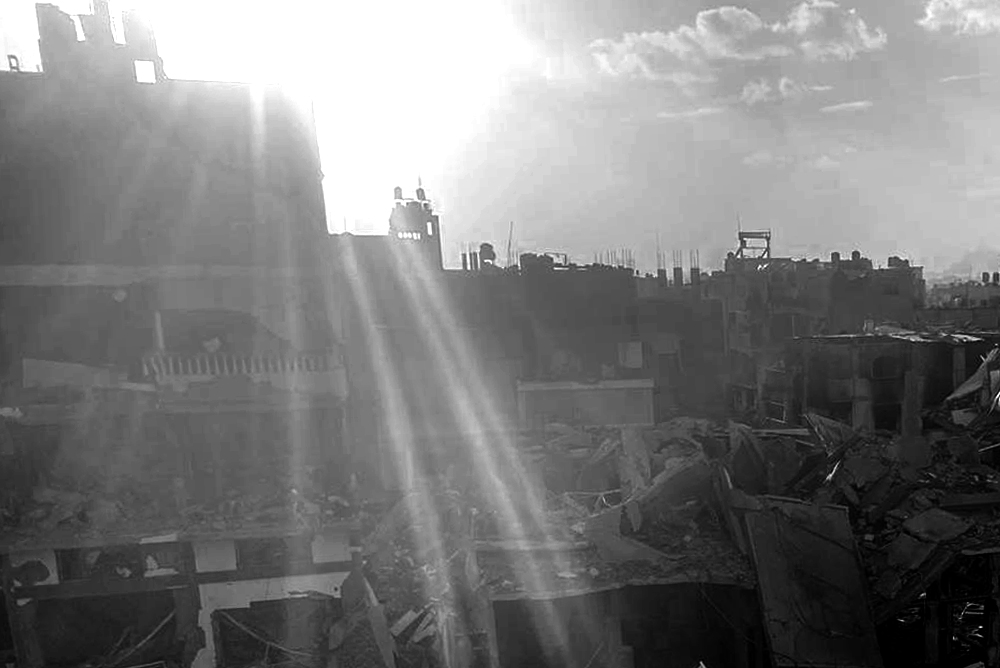
Dr. Alaa Muti' Al-Ghafir, Al-Shifa Hospital, Gaza
My name is Dr. Alaa Muti' Al-Ghafir. I was detained for a period of 56 days by the Israeli occupation forces from November 19, 2023, to January 14, 2024. I worked at the Al-Shifa Hospital in Gaza as the head of consultants in the radiology department.
During that time, I was at the hospital as a displaced person and a doctor. On November 18, 2023, I, along with my family, evacuated our home in Al-Sahaba Complex, Burj Al-Quds, in the Rimal neighborhood after the Israeli airstrikes bombed and destroyed it.
I avoided leaving the hospital department due to extreme fear, especially since the occupation forces were intensifying their shelling in the vicinity. On November 17, 2023 I witnessed the moment when the Israeli forces entered the hospital. The occupation forces raided the hospital's departments, destroying all essential medical equipment. They destroyed the CT scanner, the MRI scan, dental and breast imaging equipment, angiography X-ray machine, and all the radiology equipment.
They also extracted the memory card from all the devices. Additionally, they destroyed the building of Prince Nayef Specialized Hospital and entered the specialized surgical building through the western wall after rigging and detonating it. Finally, they cut off the electricity supply to the hospital.
After the Israeli raid Dr. Mohammed Abu Salameh informed us of the evacuation and a three-day ceasefire. We left on November 18, 2023, at 10:00 AM on foot from Al-Shifa Hospital to the Kuwait roundabout. At that time my family already left, my elderly mother was stayed put. The occupation forces prevented us from passing and forced us to return the next day. We had to go back to Shujaia, where a family hosted us until the morning of November 19. At 7:00 am, we set out again towards the supposed secure passage.
We took a taxi towards the Kuwait roundabout and then walked towards the gate in Tattareen. The road was completely destroyed and there was continuous shelling. It was so difficult pushing my mother's wheelchair over the rubble. I reached the gate raising both hands and holding my ID, dressed in the green doctor's uniform with the Ministry of Health's emblem on the surgery suit. I heard a voice calling me, saying, "Come, Doctor." I left my elderly and disabled mother alone in the street without any assistance and went towards them. They asked for my ID, verified my personal information, and took me to another location.
Two soldiers were pointing their weapons at me. They asked me to undress and empty my pockets, and to place my phone on the table. Then, they asked me to turn around to ensure I had nothing with me. A soldier tied my hands behind my back and blindfolded me with a colored band, asking me to face the wall. After half an hour they took me to a tent and interrogated. "Identify the locations of the tunnels in the hospital. Do you know the locations of the prisoners?" After that, they made me sit on my knees for two hours. Afterwards they took me to an armored vehicle. With brute force they pushed me. I hit my head and started to bleed heavily. I needed four stitches due to continuous bleeding. The armored vehicle then left, we were on the
road for approximately two hours.
I believe we arrived in the occupied territory. We were gathered in tents where we were assaulted. On the same day, they transferred us to barracks using armored vehicles, and before entering the barracks, they wrote on my back the phrase "Ministers of Health Al-Shifa Hospital." I didn't know what they wrote until later. They gave us wristbands with numbers, and my number was '990663'. After entering the barracks we were tortured and humiliated. When it was over I was sent to a doctor, after that an interrogation followed. The doctor asked if I had any diseases or problems, and inquired about my name, ID number, nature of my work, when and where I was arrested, and where I lived. After that, I was given a bag and asked to undress completely. They gave me underwear and a beige pyjama.
I stayed in the barracks for 17 days. The barracks were large and spacious, and had a high asphalt floor surrounded by zinc. Each prisoner had a mattress with a diameter not exceeding one meter, along with an old and worn-out light cover. There were approximately 120 people in the barrack. The place was divided into small sections with 10 prisoners each. We got three little meals a day; two slices of toast with a spoon of jam or butter for breakfast, two slices of toast with tuna for lunch, and two slices of toast with butter or apple for dinner. Additionally, we were given one glass of water per day. We were all hungry and thirsty all day long.
The plastic handcuffs were not removed even during the meals. Every day, we had to wake up at 5:00 am and forced to sit on our knees until midnight. If we moved, we were thrown against the barracks' fence, and we were not allowed to use the restroom unless the soldier agreed. There were no personal hygiene standards or materials provided.

